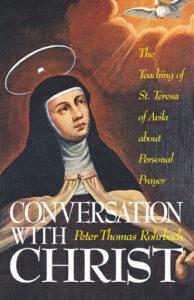WE HAVE EMPHASIZED, with calculated repetition, St. Teresa’s fundamental theory of meditation: a loving conversation with Christ. St. Teresa, though, was a clever pedagogue; she realized that it is alarmingly difficult to kneel down and inaugurate conversation with Christ immediately. Human nature being what it is, our thoughts quickly wander from prayer. Therefore, she proposed a systematic approach to this conversation with Christ.
St. Teresa well understood the psychological mechanism of our human nature, and continually gives evidence of this knowledge in her writings. There are two principal interior faculties of man, intellect and will— or as they are termed in popular writing, mind and heart. The intellect (or mind) concerns itself with acts of reasoning, thought, and consideration; the will (or heart) is occupied with acts of a volitional nature, such as love and affection. It is through the intellect that one comes to the knowledge of some object, and through the will that he begins to love it. In other words, the intellect supplies the object for the will to love; and, correspondingly, nothing is loved by the will unless it has first been presented by the intellect.
Although meditation is principally centered in the will, St. Teresa is insistent that both intellect and will be employed if meditation is to prove successful. In her program, she would have the intellect supply material for the conversation with Christ. For example, the intellect is employed to consider the passion of Christ and His sufferings; and then the will is brought into play to talk with Christ about it, express its sorrow, or promise to avoid sin in the future. In her plan, the meditation itself (or the consideration as we here term it) is the task of the intellect, while the conversation is the function of the will. The consideration is only a reasoning process by which the intellect turns the will towards Christ.
St. Teresa is careful to advise us against rushing into conversation with Christ until we are convinced we can sustain it. She admonishes us to picture Our Lord and think of Him in one of His mysteries, and then, when the heart is moved, speak to Him about the subject of the day’s meditation. This procedure will result in an orderly plan for our conversation, and will hinder wanderings of the mind. The average individual is definitely not accustomed to this interior conversation, and, hence, St. Teresa would have him approach the problem systematically.
In her outline of prayer, St. Teresa clearly distinguishes the work of the intellect and the work of the will. To the intellectual process she adds a function known in psychology as the intellectual memory. In her treatment of the matter, the intellectual procedure embraces two elements: the formation of images from the memory, and intellectual reasoning. The intellectual memory depicts some scene in Christ’s life, and the intellect itself examines it; then the will employs the result.
Needless to note, the conversation is the all-important element here; the work of the intellect merely prepares for the conversation and serves as a guide for it. Some souls require a greater amount of reasoning before they are able to begin their conversation; some require less. There is no hard and fast rule on the matter; here, as elsewhere, star differs from star.
This intellectual prelude to our conversation with Christ has frightened many. There is a general misunderstanding that meditation must be a process of reasoning, deductions, and syllogisms. Naturally, such a caricature of meditation is unappealing to most of us. Actually, there is nothing complicated or highly intellectual about it. In the consideration, St. Teresa merely asks us to carefully consider Christ in one of His mysteries in much the same manner as we examine a newspaper story about some figure in daily life.
In our prayer we are not to engage in subtle philosophic thought; nor are we to ponder over the truths of faith as would a speculative theologian. All St. Teresa would have us do is fill our minds and memories with Christ, so that we might more easily talk to Him. She wisely enunciates a fundamental rule of meditation: that prayer consists not in thinking much, but in loving much.
This article is taken from a chapter in Conversation With Christ by Fr. Peter Thomas Rorhbach, OCD, which is available from TAN Books.








